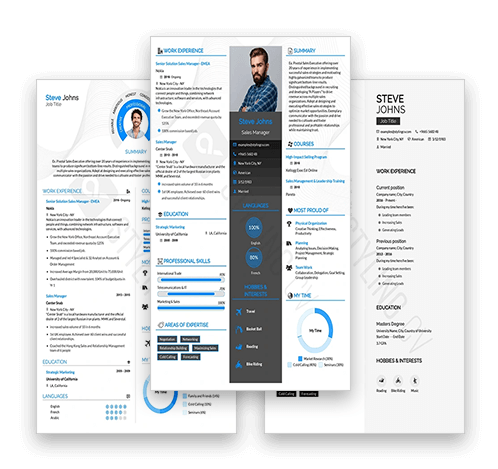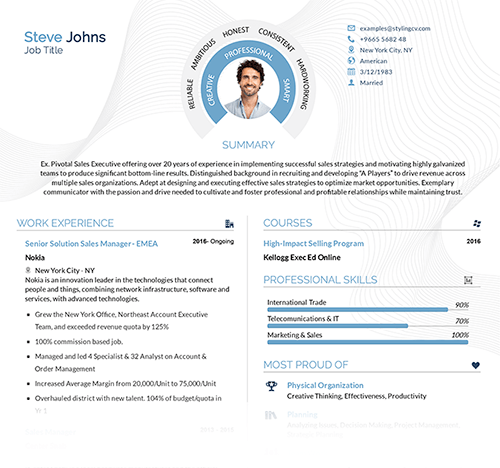Comprehensive guide to women’s employment in Saudi Arabia in 2025. Discover opportunities, rights, top sectors, and success stories under Vision 2030.
Sarah Reynolds
Content Specialist
I’m Sarah Reynolds, a Content Specialist at StylingCV, where I help professionals tell their stories with clarity and confidence.My focus is on creating content that bridges the gap between job seekers and hiring managers — offering actionable advice on resume writing, interview preparation, and personal branding. I’m passionate about turning career challenges into clear, strategic steps that lead to meaningful opportunities.At StylingCV, I work with an incredible team to deliver resources that empower people to present their best selves — both on paper and in person.Let’s connect if you’re passionate about career growth, creative communication, or making resumes that truly stand out.
Sources & References
- ✓ Career development best practices from leading HR associations
- ✓ Industry research and surveys
- ✓ Expert interviews and case studies
- ✓ Verified by professional career advisors
Last updated: November 26, 2025
Women in the Saudi Workforce: Opportunities, Rights & Career Growth [2025]
Comprehensive guide to women’s employment in Saudi Arabia in 2025. Discover opportunities, rights, top sectors, and success stories under Vision 2030.
Sarah Reynolds
Content Specialist
# Women in the Saudi Workforce: Opportunities, Rights & Career Growth [2025]
📖 Introduction: Transformation of Women’s Employment in Saudi Arabia
Over the past decade, Saudi Arabia has witnessed a profound transformation in women’s participation in the workforce. Historically constrained by social norms and limited job opportunities, Saudi women today are emerging as pivotal contributors to the Kingdom’s economic development. According to the Saudi General Authority for Statistics, women’s labor force participation increased from approximately 17.8% in 2018 to over 33% in 2024, reflecting a dramatic cultural and legislative shift. This transformation aligns with broader socio-economic reforms and a vision to diversify the economy beyond oil, positioning women as critical drivers of growth.
—
👩💼 Vision 2030 and Women’s Empowerment Goals
Central to this transformation is Saudi Arabia’s Vision 2030, a strategic framework to modernize the economy and society. Vision 2030 explicitly highlights women’s empowerment as a cornerstone for national progress, aiming to raise female workforce participation to 47% by 2030. The initiative supports education, workforce integration, entrepreneurship, and leadership development. Programs such as the “Women Empowerment Program” promote skill acquisition and employment, while the Saudi Human Resources Development Fund (HRDF) offers training subsidies encouraging female employment in priority sectors. These targets and programs underscore the Kingdom’s commitment to creating an inclusive and sustainable labor market.
—
📜 Legal Rights and Protections for Female Workers
Saudi Arabia has strengthened legal frameworks to protect female employees’ rights, fostering a safer and more equitable work environment. The Labor Law of Saudi Arabia and Anti-Harassment Law provide robust protections against workplace discrimination and abuse. Key provisions include:
- Equal pay for equal work, mandated by the Ministry of Human Resources and Social Development (HRSD).
- Prohibition of gender-based discrimination in hiring, promotion, and remuneration.
- Maternity leave of 10 weeks with full pay, alongside flexible work hour options.
- Protection from harassment with legal recourse and penalties for offenders.
Moreover, the removal of the male guardianship system has empowered women to independently seek employment and sign contracts, a significant milestone in labor rights.
—
🔝 Top Industries for Women
Saudi women have made substantial inroads across various sectors, with certain industries leading in female employment:
Healthcare
Women constitute nearly 50% of the healthcare workforce, including doctors, nurses, pharmacists, and allied health professionals. Hospitals and clinics prioritize female staff to cater to cultural preferences, driving demand for qualified women.
Education
Education remains a dominant employer of Saudi women, especially in teaching, administration, and academic research. Female educators are integral to the Kingdom’s focus on improving literacy and higher education enrollment.
Banking and Finance
The banking sector has actively recruited women into roles ranging from customer service to senior management. Women now represent around 30% of employees in major Saudi banks, supported by initiatives encouraging female leadership.
Technology
The tech industry is a rapidly growing employer of Saudi women, particularly in software development, cybersecurity, and digital marketing. Government-backed programs such as “Digital Saudi” offer scholarships and training to upskill women in STEM fields.
Retail and Hospitality
Retail chains and hospitality firms employ women in sales, customer relations, and administrative roles. Women-friendly work policies and flexible hours have helped increase female participation in these sectors.
Government
The public sector is a significant employer of women, with ministries actively recruiting for policy, planning, and administrative positions. Female representation in government roles has risen to nearly 25%, reflecting inclusive hiring policies.
—
👩💼 Breaking Barriers: Women in Non-Traditional Fields
Saudi women are increasingly entering non-traditional fields such as engineering, law enforcement, aviation, and the military. For example:
- Saudi Air Force accepted its first female pilots in 2023.
- Women engineers are contributing to mega-projects like NEOM and the Red Sea Development.
- Female lawyers now practice independently in courts, with some appointed as judges.
These advances challenge societal norms and open new avenues for career growth.
—
💰 Salary Equality and Compensation
While progress has been made, salary equality remains a work in progress. According to a 2024 report by the World Economic Forum, the gender wage gap in Saudi Arabia stands at approximately 20%, lower than the global average but still significant. However, government regulations now mandate equal pay for equal work in public and private sectors. Companies with transparent salary structures and diversity policies show higher female retention and satisfaction rates.
—
⚖️ Work-Life Balance and Family Support
Work-life balance is a critical concern for Saudi women balancing professional and family roles. Recent reforms introduced:
- Flexible working hours and remote work options.
- On-site childcare facilities in many workplaces.
- Enhanced maternity leave policies and parental support programs.
These initiatives aim to reduce barriers for women to sustain long-term careers without compromising family commitments.
—
🌟 Entrepreneurship Opportunities for Saudi Women
Entrepreneurship is an increasingly viable path for women in Saudi Arabia. The Monsha’at (Small and Medium Enterprises General Authority) reports a 35% increase in women-owned SMEs between 2020 and 2024. The government supports female entrepreneurs through:
- Access to funding and low-interest loans.
- Training and mentorship programs.
- Business incubators focusing on women-led startups.
- Platforms like Saudi Women’s Entrepreneurial Network (SWEN) facilitating networking.
Successful ventures span e-commerce, fashion, tech startups, and consulting services, showcasing women’s growing economic influence.
—
⚠️ Challenges and How to Overcome Them
Despite progress, challenges persist:
- Cultural and Social Norms: Deep-rooted expectations can limit women’s career choices.
- Workplace Bias: Subtle discrimination and limited leadership roles remain barriers.
- Networking Gaps: Women often lack access to influential professional networks.
Overcoming these challenges requires:
- Continued awareness campaigns to shift societal perceptions.
- Corporate policies promoting diversity and inclusion.
- Mentorship programs pairing experienced leaders with young women.
- Government incentives rewarding companies excelling in female employment.
—
✅ Success Stories and Role Models
Inspiring Saudi women are leading change across sectors:
- Lubna Olayan, a pioneering businesswoman, chairs Olayan Financing Company and advocates for women in leadership.
- Sarah Al Suhaimi, Chairperson of Tadawul (Saudi Stock Exchange), broke glass ceilings in finance.
- Reema bint Bandar Al Saud, Saudi Arabia’s first female ambassador to the US, exemplifies diplomacy and leadership.
- Emerging tech entrepreneur Maha Al-Ghunaim founded a successful AI startup, inspiring young innovators.
These role models motivate younger generations to pursue ambitious careers.
—
📚 Resources and Support Networks
Numerous organizations support women’s workforce integration:
- Saudi Women’s Network offers career development and networking.
- Tamheer Program provides internships to fresh graduates.
- Women Empowerment Initiatives by HRSD facilitate training and employment.
- Private sector-led groups like Women in Tech Saudi nurture skill-building.
These resources offer mentorship, skill development, and community support essential for career advancement.
—
🚀 Future Outlook for Women in KSA Workforce
Looking ahead to 2025 and beyond, women’s role in Saudi Arabia’s workforce is set to expand dramatically. With Vision 2030 targets guiding policy, continued legal reforms, and cultural shifts, women will occupy more leadership roles, engage in diverse industries, and drive innovation. The anticipated increase in female labor participation to nearly 40% by 2025 will stimulate economic growth and social progress. Saudi women are poised not only to participate but to lead the Kingdom into a dynamic, inclusive future.
—
Conclusion
The journey of Saudi women in the workforce is one of resilience, empowerment, and transformation. From legal reforms to entrepreneurship, women in the Kingdom are breaking barriers and reshaping the economic landscape. As Saudi Arabia advances towards Vision 2030, supporting women’s rights, opportunities, and career growth remains both a national priority and a catalyst for sustainable development. Through continued commitment and collaboration, the future holds immense promise for women professionals across the Kingdom.
—
🚀 Ready to Build Your Saudi-Ready Resume?
Create your ATS-optimized, Saudi-specific resume in minutes with StylingCV AI. Our templates are designed for:
- ✅ Vision 2030 alignment
- ✅ Saudi ATS systems
- ✅ Bilingual formatting (Arabic + English)
- ✅ Saudization keywords
- ✅ NEOM & giga-project roles
👉 Start Building Your Resume Now
Frequently Asked Questions
Sarah Reynolds
Content Specialist
I’m Sarah Reynolds, a Content Specialist at StylingCV, where I help professionals tell their stories with clarity and confidence.My focus is on creating content that bridges the gap between job seekers and hiring managers — offering actionable advice on resume writing, interview preparation, and personal branding. I’m passionate about turning career challenges into clear, strategic steps that lead to meaningful opportunities.At StylingCV, I work with an incredible team to deliver resources that empower people to present their best selves — both on paper and in person.Let’s connect if you’re passionate about career growth, creative communication, or making resumes that truly stand out.
Sources & References
- ✓ Career development best practices from leading HR associations
- ✓ Industry research and surveys
- ✓ Expert interviews and case studies
- ✓ Verified by professional career advisors
Last updated: November 26, 2025
Related Posts
Tags
⚡ Create Your Resume in Just 5 Minutes
Templates designed by hiring experts. No design skills needed.
 Building Your Resume Now
⭐ 4.8/5 Rating
Building Your Resume Now
⭐ 4.8/5 Rating
3,000+ Success Stories


